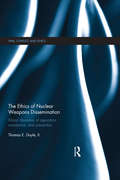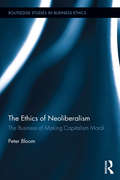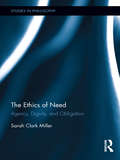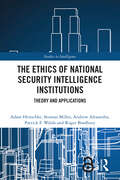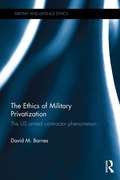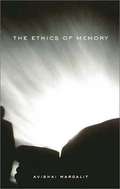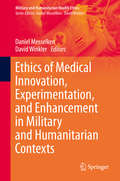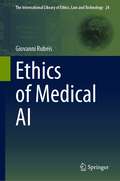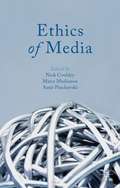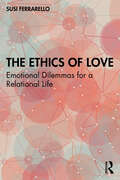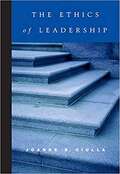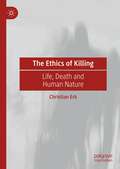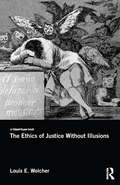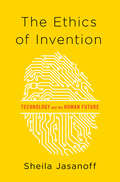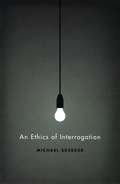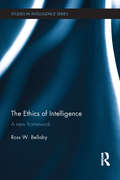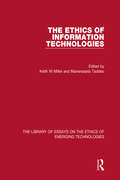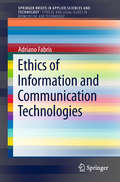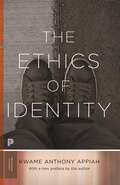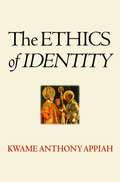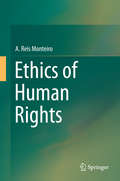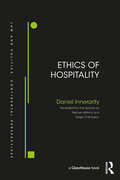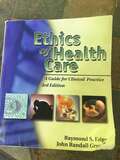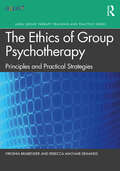- Table View
- List View
The Ethics of Nuclear Weapons Dissemination: Moral Dilemmas of Aspiration, Avoidance and Prevention (War, Conflict and Ethics)
by Thomas E. Doyle, IIThis book examines the moral dilemmas of nuclear dissemination, and the justifications of both nuclear pursuit and avoidance by contemporary states. Applying Constructivist methodologies and moral theory, the author analyses a core set of moral dilemmas that ensnare decision-makers amongst state and non-state nuclear aspirants, as well as amongst states committed to preventing horizontal proliferation. The book shows that the character, structure and implications of these dilemmas have not yet been adequately understood or appreciated, and that such an understanding is necessary for an effective set of nonproliferation policies. Furthermore, it shows that the dilemmas’ force and political policy import are evident in the 'discourses' that diverse actors undertake to defend their nuclear choices, and how the dilemmas of nuclear aspirants are implicated in those of nuclear preventers. The author advocates a number of policy recommendations that reinforce some already made by scholars and experts but, more importantly, others that advise significantly different courses of action. The book reveals how the moral dilemmas of nuclear aspiration, avoidance, and prevention constitute the security dilemmas and paradoxes that comprise much of the 21st century security environment. This book will be of much interest to students of nuclear proliferation, international relations, ethics, and international security studies.
The Ethics of Neoliberalism: The Business of Making Capitalism Moral (Routledge Studies in Business Ethics)
by Peter BloomThe 21st century is the age of "neo-liberalism" – a time when the free market is spreading to all areas of economic, political and social life. Yet how is this changing our individual and collective ethics? Is capitalism also becoming our new morality? From the growing popular demand for corporate social responsibility to personal desire for "work-life balance" it would appear that non-market ideals are not only surviving but also thriving. Why then does it seem that capitalism remains as strong as ever? The Ethics of Neoliberalism boldly proposes that neoliberalism strategically co-opts traditional ethics to ideologically and structurally strengthen capitalism. It produces "the ethical capitalist subject" who is personally responsible for making their society, workplace and even their lives "more ethical" in the face of an immoral but seemingly permanent free market. Rather than altering our morality, neoliberalism "individualizes" ethics, making us personally responsible for dealing with and resolving its moral failings. In doing so, individuals end up perpetuating the very market system that they morally oppose and feel powerless to ultimately change. This analysis reveals the complex and paradoxical way capitalism is currently shaping us as "ethical subjects". People are increasingly asked to ethically "save" capitalism both collectively and personally. This can range from the "moral responsibility" to politically accept austerity following the financial crisis to the willingness of employees to sacrifice their time and energy to make their neoliberal organizations more "humane" to the efforts by individuals to contribute to their family and communities despite the pressures of a franetic global business environment. Neoliberalism, thus, uses our ethics against us, relying on our "good nature" and sense of personal responsibility to reduce its human cost in practice. Ironically
The Ethics of Need: Agency, Dignity, and Obligation
by Sarah Clark MillerThe Ethics of Need: Agency, Dignity, and Obligation argues for the philosophical importance of the notion of need and for an ethical framework through which we can determine which needs have moral significance. In the volume, Sarah Clark Miller synthesizes insights from Kantian and feminist care ethics to establish that our mutual and inevitable interdependence gives rise to a duty to care for the needs of others. Further, she argues that we are obligated not merely to meet others’ needs but to do so in a manner that expresses "dignifying care," a concept that captures how human interactions can grant or deny equal moral standing and inclusion in a moral community. She illuminates these theoretical developments by examining two cases where urgent needs require a caring and dignifying response: the needs of the elderly and the needs of global strangers. Those working in the areas of feminist theory, women’s studies, aging studies, bioethics, and global studies should find this volume of interest.
The Ethics of National Security Intelligence Institutions: Theory and Applications (Studies in Intelligence)
by Adam Henschke Seumas Miller Andrew Alexandra Patrick F. Walsh Roger BradburyThis book explores the ethics of national security intelligence institutions operating in contemporary liberal democracies.Intelligence collection by agencies such as the CIA, MI6, and Mossad involves practices that are apparently inconsistent with the principles of ordinary morality – practices such as lying, spying, manipulation, and covert action. However, in the defence of national security, such practices may not only be morally permissible, but may also under some circumstances be morally obligatory. One approach to the ethics of national security intelligence activity has been to draw from the just war tradition (so-called ‘just intelligence theory’). This book identifies significant limitations of this approach and offers a new, institutionally based, teleological normative framework. In doing so, it revises some familiar principles designed for application to kinetic wars, such as necessity and proportionality, and invokes some additional ones, such as reciprocity and trust. It goes on to explore the applications of this framework and a revised set of principles for national security intelligence institutions and practices in contemporary and emerging political and technological settings.This book will be of much interest to students of intelligence studies, ethics, security studies and International Relations.
The Ethics of Military Privatization: The US Armed Contractor Phenomenon (Military and Defence Ethics)
by David M. BarnesThis book explores the ethical implications of using armed contractors, taking a consequentialist approach to this multidisciplinary debate. While privatization is not a new concept for the US military, the public debate on military privatization is limited to legal, financial, and pragmatic concerns. A critical assessment of the ethical dimensions of military privatization in general is missing. More specifically, in light of the increased reliance upon armed contractors, it must be asked whether it is morally permissible for governments to employ them at all. To this end, this book explores four areas that highlight the ethical implications of using armed contractors: how armed contractors are distinct from soldiers and mercenaries; the commodification of force; the belligerent equality of combatants; and the impact of armed contractors on the professional military. While some take an absolutist position, wanting to bar the use of private military altogether, this book reveals how these absolutist arguments are problematic and highlights that there are circumstances where turning to private force may be the only option. Recognising that outsourcing force will continue, this book thus proposes some changes to account for the problems of commodification, belligerent equality, and the challenge to the military profession. This book will be of interest to students of private security, military studies, ethics, security studies, and IR in general.
The Ethics of Memory
by Avishai MargalitMuch of the intense current interest in collective memory concerns the politics of memory. In a book that asks, "Is there an ethics of memory?" Avishai Margalit addresses a separate, perhaps more pressing, set of concerns. <p><p> The idea he pursues is that the past, connecting people to each other, makes possible the kinds of "thick" relations we can call truly ethical. Thick relations, he argues, are those that we have with family and friends, lovers and neighbors, our tribe and our nation--and they are all dependent on shared memories. But we also have "thin" relations with total strangers, people with whom we have nothing in common except our common humanity. A central idea of the ethics of memory is that when radical evil attacks our shared humanity, we ought as human beings to remember the victims.<p> Margalit's work offers a philosophy for our time, when, in the wake of overwhelming atrocities, memory can seem more crippling than liberating, a force more for revenge than for reconciliation. Morally powerful, deeply learned, and elegantly written, The Ethics of Memory draws on the resources of millennia of Western philosophy and religion to provide us with healing ideas that will engage all of us who care about the nature of our relations to others.
Ethics of Medical Innovation, Experimentation, and Enhancement in Military and Humanitarian Contexts (Military and Humanitarian Health Ethics)
by Daniel Messelken David WinklerThis book discusses ethical questions surrounding research and innovation in military and humanitarian contexts. It focuses on human enhancement in the military. Recently, the availability of medical enhancement designed to make soldiers more capable of surviving during conflict, as well as enabling them to defeat their enemies, has emerged. Innovation and medical research in military and humanitarian contexts may thus yield positive effects, but simultaneously leads to a number of highly problematic ethical issues. The work contains contributions on medical ethics that take into account the specific roles and obligations of military and humanitarian health care providers and the ethical problems they encounter. They cover different aspects of research and innovation such as vaccine development, medical enhancement, compassionate and experimental drug use, research and application of new technologies such as wearables, “Humanitarian innovation” to cope with scarce resources, Biometrics, big data, etc.The book is of interest and importance to researchers and policy makers involved with human enhancement, medical research, and innovation in military and humanitarian missions.
Ethics of Medical AI (The International Library of Ethics, Law and Technology #24)
by Giovanni RubeisThis is the first book to provide a coherent overview over the ethical implications of AI-related technologies in medicine. It explores how these technologies transform practices, relationships, and environments in the clinical field. It provides an introduction into ethical issues such as data security and privacy protection, bias and algorithmic fairness, trust and transparency, challenges to the doctor-patient relationship, and new perspectives for informed consent. The book focuses on the transformative impact that technology is having on medicine, and discusses several strategies for dealing with the resulting challenges. It also introduces innovative methods of ethics research for addressing existing desiderata and future challenges. This book is written to inform health care professionals, policy-makers, and researchers in medicine, health sciences, nursing science, social sciences, and ethics, but may also function as a primary textbook for graduate as wellas undergraduate university courses.
Ethics of Media
by Nick Couldry Mirca Madianou Amit PinchevskiEthics of Media reopens the question of media ethics. Taking an exploratory rather than prescriptive approach, an esteemed collection of contributors tackle the diverse areas of moral questioning at work within various broadcasting practices, accommodating the plurality and complexity of present-day ethical challenges posed by the world of media.
The Ethics of Love: Emotional Dilemmas for a Relational Life
by Susi FerrarelloThis book explores the ethical and psychological dilemmas connected to the lived experiences of love, uniquely proposing an ethical framework that can be applied in loving relationships. The book provides an introduction to the study of ethics, moral psychology, and ancient philosophy. Examining key themes of love, such as unconditional love, romantic love, anger, desperation, and fairness, this book offers the reader a way to exercise and strengthen their personal critical thinking on ethical dilemmas, especially in relation to loving feelings. The author believes that ethics is the heart of love in the same way as logic is the brain of reasoning; we do not need ethics to love but we can love in a much healthier way if we train our ethical skills to love. After laying the theoretical framework for the book, chapters are organized into themes relating to ethical problems and begin with an exemplary piece from Greek and Latin literature. Using these writings as a starting point, Susi Ferrarello discusses whether it is possible to have a sound ethical theory of love, especially in cases relating to justice, despair, and rage, and demonstrates how this framework can be applied in new and established relationships. Filled with case studies throughout, spiritual exercises are listed at the end of chapters to help the reader increase their understanding of love and their ethical choices surrounding emotional dilemmas. This interdisciplinary book is essential reading for undergraduate and graduate students who take classes on ethics, marriage and family therapy, psychology, philosophy, classics, ancient philosophy, and politics, as well as those interested in the ethics of love and emotional decision-making.
The Ethics Of Leadership
by Joanne B. CiullaThe focus of ETHICS OF LEADERSHIP is the ethical challenges that are distinctive to leaders and leadership. Organized around themes such as power and the public and private morality of leaders, the book explores the ethical issues of leadership in a variety of contexts including, business, NGOs, and government. It integrates material on ethics and leadership from the great Eastern and Western philosophers with leadership literature and case studies. This multi-disciplinary approach helps philosophers and leadership scholars present a fully integrated view of the subject.
The Ethics of Killing: Life, Death and Human Nature
by Christian ErkIn this book, Christian Erk examines the ethical (im)permissibility of killing human beings in general and of selected killings in particular, namely suicide, lethal selfdefence, abortion and euthanasia, as well as organ transplantation and assisted suicide. He does so by addressing a range of important ethical questions: What does it mean to act? Of what elements is an action comprised? What is the difference between a good or evil action and a permissible or impermissible action? How can we determine whether an action is good or evil? Is there a moral duty not to kill? Is this duty held by and against all human beings or only persons? What and who is a person? What is human dignity and who has it? What is it that is actually taken when somebody is killed, i.e. what is life? And closely related to that: What and when is death? By integrating the answers to these questions into an argumentative architecture, the book offers a comprehensive exploration of one of the most fundamental questions of mankind: Under which conditions, if any, is killing human beings ethically permissible?
The Ethics of Justice Without Illusions
by Louis E. WolcherThe founding premise of this book is that the nimbus of prestige, which once surrounded the idea of justice, has now been dimmed to such a degree that it is no longer sufficient to secure the possibility of a good conscience for those who undertake, in good faith, to make the world a better place in the spheres of politics and law. The many decent human beings who have noticed and experienced this diminishment of justice’s prestige find themselves in a thoroughly disenchanted existential situation. For them, the attempt to do justice without the illusion of being grounded in something beyond the sheer facticity of their own performances is a distinctly ethical theme, which cries out to be investigated in its own right. Heeding the cry, this book asks and attempts to answer the following fundamental ethical question: is a life in the law – even one spent in the pursuit of justice – worth living, and if so, how can a disenchanted person come to bear the living of it without constantly having to engage in self-deception? If Nietzsche is right that living without illusions is impossible for human beings, then the most important ethical implication of this essentially anthropological fact goes far beyond the question of what illusions we ought to choose. It must also include the question of whether we should succumb to that most seductive and pernicious of all illusions: namely, the belief that exercising great care and responsibility in choosing our illusions – which we might then call our ‘principles of justice’ – excuses us ethically for what we do to others in their name. The culmination of a 10 year legal-philosophical project, this book will appeal to graduate students, scholars and curious non-academic intellectuals interested in continental philosophy, critical legal theory, postmodern theology, the philosophy of human rights and the study of individual ethics in the context of law.
The Ethics of Invention: Technology and the Human Future
by Sheila JasanoffWe live in a world increasingly governed by technology--but to what end? Technology rules us as much as laws do. It shapes the legal, social, and ethical environments in which we act. Every time we cross a street, drive a car, or go to the doctor, we submit to the silent power of technology. Yet, much of the time, the influence of technology on our lives goes unchallenged by citizens and our elected representatives. In The Ethics of Invention, renowned scholar Sheila Jasanoff dissects the ways in which we delegate power to technological systems and asks how we might regain control. Our embrace of novel technological pathways, Jasanoff shows, leads to a complex interplay among technology, ethics, and human rights. Inventions like pesticides or GMOs can reduce hunger but can also cause unexpected harm to people and the environment. Often, as in the case of CFCs creating a hole in the ozone layer, it takes decades before we even realize that any damage has been done. Advances in biotechnology, from GMOs to gene editing, have given us tools to tinker with life itself, leading some to worry that human dignity and even human nature are under threat. But despite many reasons for caution, we continue to march heedlessly into ethically troubled waters. As Jasanoff ranges across these and other themes, she challenges the common assumption that technology is an apolitical and amoral force. Technology, she masterfully demonstrates, can warp the meaning of democracy and citizenship unless we carefully consider how to direct its power rather than let ourselves be shaped by it. The Ethics of Invention makes a bold argument for a future in which societies work together--in open, democratic dialogue--to debate not only the perils but even more the promises of technology.
An Ethics of Interrogation
by Michael SkerkerThe act of interrogation, and the debate over its use, pervades our culture, whether through fictionalized depictions in movies and television or discussions of real-life interrogations on the news. But despite daily mentions of the practice in the media, there is a lack of informed commentary on its moral implications. Moving beyond the narrow focus on torture that has characterized most work on the subject, An Ethics of Interrogation is the first book to fully address this complex issue. In this important new examination of a controversial subject, Michael Skerker confronts a host of philosophical and legal issues, from the right to privacy and the privilege against compelled self-incrimination to prisoner rights and the legal consequences of different modes of interrogation for both domestic criminal and foreign terror suspects. These topics raise serious questions about the morality of keeping secrets as well as the rights of suspected terrorists and insurgents. Thoughtful consideration of these subjects leads Skerker to specific policy recommendations for law enforcement, military, and intelligence professionals.
The Ethics of Intelligence: A new framework (Studies in Intelligence)
by Ross W. BellabyThis book starts from the proposition that the field of intelligence lacks any systematic ethical review, and then develops a framework based on the notion of harm and the establishment of Just Intelligence Principles. As the professional practice of intelligence collection adapts to the changing environment of the twenty-first century, many academic experts and intelligence professionals have called for a coherent ethical framework that outlines exactly when, by what means and to what ends intelligence is justified. Recent controversies, including reports of abuse at Guantanamo Bay and Abu Ghraib, allegations of extraordinary rendition programmes and the ever-increasing pervasiveness of the ‘surveillance state’, have all raised concerns regarding the role of intelligence in society. As a result, there is increased debate regarding the question of whether or not intelligence collection can be carried out ethically. The Ethics of Intelligence tackles this question by creating an ethical framework specifically designed for intelligence that is capable of outlining under what circumstances, if any, different intelligence collection activities are ethically permissible. The book examines three of the main collection disciplines in the field of intelligence studies: imagery intelligence, signals intelligence and human intelligence. By applying the ethical framework established at the beginning of the book to these three important intelligence collection disciplines, it is possible to better understand the ethical framework while also demonstrating its real-life applicability. This book will be of much interest to students of intelligence studies, ethics, war and conflict studies, security studies and IR.
The Ethics of Insurgency
by Michael L. GrossAs insurgencies rage, a burning question remains: how should insurgents fight technologically superior state armies? Commentators rarely ask this question because the catchphrase 'we fight by the rules, but they don't' is nearly axiomatic. But truly, are all forms of guerrilla warfare equally reprehensible? Can we think cogently about just guerrilla warfare? May guerrilla tactics such as laying improvised explosive devices (IEDs), assassinating informers, using human shields, seizing prisoners of war, conducting cyber strikes against civilians, manipulating the media, looting resources, or using nonviolence to provoke violence prove acceptable under the changing norms of contemporary warfare? The short answer is 'yes', but modern guerrilla warfare requires a great deal of qualification, explanation, and argumentation before it joins the repertoire of acceptable military behavior. Not all insurgents fight justly, but guerrilla tactics and strategies are also not always the heinous practices that state powers often portray them to be.
The Ethics of Information Technologies (The\library Of Essays On The Ethics Of Emerging Technologies Ser.)
by Keith MillerThis volume collects key influential papers that have animated the debate about information computer ethics over the past three decades, covering issues such as privacy, online trust, anonymity, values sensitive design, machine ethics, professional conduct and moral responsibility of software developers. These previously published articles have set the tone of the discussion and bringing them together here in one volume provides lecturers and students with a one-stop resource with which to navigate the debate.
Ethics of Information and Communication Technologies (SpringerBriefs in Applied Sciences and Technology)
by Adriano FabrisThis book discusses key ethical and deontological problems concerning the use of the most common information and communication devices. It focuses on the challenges of the new environments we now find ourselves in thanks to these technologies, and the issues arising from the newly established relationship between the virtual sphere and the real world. Each aspect is analysed by starting from a very specific example or a case study presenting a dilemma that can only be resolved by making a reasoned ethical choice. Rather than thematically addressing only one of the many aspects mentioned above (for example, computer ethics or social network ethics), the book presents a comprehensive introduction to, and a co-ordinated overview of, the various deontological and ethical issues regarding the spread of the most common information and communication technologies.
The Ethics of Identity (Princeton Classics #132)
by Kwame Anthony AppiahA bold vision of liberal humanism for navigating today’s complex world of growing identity politics and rising nationalismCollective identities such as race, nationality, religion, gender, and sexuality clamor for recognition and respect, sometimes at the expense of other things we value. To what extent do they constrain our freedom, and to what extent do they enable our individuality? Is diversity of value in itself? Has the rhetoric of human rights been overstretched? Kwame Anthony Appiah draws on thinkers through the ages and across the globe to explore such questions, developing an account of ethics that connects moral obligations with collective allegiances and that takes aim at clichés and received ideas about identity. This classic book takes seriously both the claims of individuality—the task of making a life—and the claims of identity, these large and often abstract social categories through which we define ourselves.
The Ethics of Identity (Princeton Classics Ser. #132)
by Kwame Anthony AppiahRace, ethnicity, nationality, religion, gender, sexuality: in the past couple of decades, a great deal of attention has been paid to such collective identities. They clamor for recognition and respect, sometimes at the expense of other things we value. But to what extent do "identities" constrain our freedom, our ability to make an individual life, and to what extent do they enable our individuality? In this beautifully written work, renowned philosopher and African Studies scholar Kwame Anthony Appiah draws on thinkers through the ages and across the globe to explore such questions.The Ethics of Identity takes seriously both the claims of individuality—the task of making a life—and the claims of identity, these large and often abstract social categories through which we define ourselves.What sort of life one should lead is a subject that has preoccupied moral and political thinkers from Aristotle to Mill. Here, Appiah develops an account of ethics, in just this venerable sense—but an account that connects moral obligations with collective allegiances, our individuality with our identities. As he observes, the question who we are has always been linked to the question what we are.Adopting a broadly interdisciplinary perspective, Appiah takes aim at the clichés and received ideas amid which talk of identity so often founders. Is "culture" a good? For that matter, does the concept of culture really explain anything? Is diversity of value in itself? Are moral obligations the only kind there are? Has the rhetoric of "human rights" been overstretched? In the end, Appiah's arguments make it harder to think of the world as divided between the West and the Rest; between locals and cosmopolitans; between Us and Them. The result is a new vision of liberal humanism—one that can accommodate the vagaries and variety that make us human.
Ethics of Human Rights
by A. Reis MonteiroThis volume focuses on the ethical significance of human rights, aiming at contributing to a universal culture of human rights with deep roots and wide horizons. Its purpose, scope and rationale are reflected in the three-part structure of the manuscript. Part I has a broad introductory historical, theoretical and legal character. Part II submits that an Ethics of Human Rights is best understood as an Ethics of Recognition of human worth, dignity and rights. Moreover, it is argued that human worth consists in the perfectibility of the human species, rooted in its semiotic nature, to be accomplished through the perfecting of human beings, for which the right to education is key. In Part III, the main legal and political outcomes of the Human Rights Revolution are described and answers to the most lasting and common criticisms of human rights are provided. To conclude, the human stature of the Big Five drafters of the Universal Declaration of Human Rights is profiled and the priority that should be recognized to human rights education is highlighted. Some appendices supplement the manuscript. While making a case for the high value and liberating power of the idea and ideal of human rights, objections, controversies and uncertainties are not at all overlooked and emerging issues are explored. The diversity of content of this volume meets many needs of the typical syllabus for a human rights course.
Ethics of Hospitality (Law and Politics)
by Daniel InnerarityThe source of hospitality lies in the fundamental ethical experiences that make up the fabric of the social lives of people. Therein lies a primary form of humanity. Whether we are guests or hosts, this reveals our situation in a world made up of receiving and meeting, leaving room for the liberty to give and receive beyond the imperatives of reciprocity. This book proposes an ethic that promotes the possibility of stirring emotion before that of protecting ourselves from unexpected encounters. Fundamental ethical competence consists of opening up to the wholly other and to others, to be accessible to the world’s solicitations. There is moral superiority of vulnerable love over control and moderation, of generous passion over rational prudence and of excess over exchange. Constructing an ethic of hospitality is essential at a time when we are torn between the imperatives of modernization and growth and the demands of concern and protection. The experience we all have today, that of the fragility of the world, is giving rise to a powerful tendency toward solicitude. From such a perspective, the duty of individuals no longer consists of protecting themselves from society, but of defending it, taking care of a social fabric outside of which no identity can be formed.
Ethics Of Health Care: A Guide For Clinical Practice
by Raymond S. Edge John Randall GrovesEthics of Health Care: A Guide for Clinical Practice, 3E is designed to guide health care students and practitioners through a wide variety of areas involving ethical controversies. It provides a background in value development and ethical theories, including numerous real-life examples to stimulate discussion and thought.
The Ethics of Group Psychotherapy: Principles and Practical Strategies (AGPA Group Therapy Training and Practice Series)
by Virginia Brabender Rebecca MacNair-SemandsThe Ethics of Group Psychotherapy provides group psychotherapists with the ethical and legal foundation needed to engage in effective decision-making in their everyday group practices. This text provides readers with a framework for understanding ethical dilemmas through a review of major models of ethical thinking, including principlism, feminism and the ethics of care, and virtue ethics. The authors use this foundation to explore those problems emerging most routinely in group practice, among which are safeguarding members’ personal information, protecting members’ autonomy, and helping members to process differences—particularly those related to privilege and oppression—in a way that furthers interpersonal relations and social justice. Throughout the text, practical tools such as using assessments to aid in member selection and tracking progress and outcome through measurement-based care are offered that bolster the group psychotherapist’s effectiveness in ethical decision-making. Featuring questions for discussion and items to assess the reader’s master of the material, this text will be a valuable tool in classroom and small-group learning.
